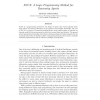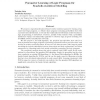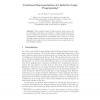1020 search results - page 63 / 204 » Tight Semantics for Logic Programs |
115
Voted
CORR
2004
Springer
15 years 2 months ago
2004
Springer
FLUX is a programming method for the design of agents that reason logically about their actions and sensor information in the presence of incomplete knowledge. The core of FLUX is...
162
Voted
CORR
2011
Springer
14 years 6 months ago
2011
Springer
We propose a logical/mathematical framework for statistical parameter learning of parameterized logic programs, i.e. de
nite clause programs containing probabilistic facts with a ...
112
Voted
LPNMR
2004
Springer
15 years 8 months ago
2004
Springer
Abstract. We present a declarative language, PP, for the specification of preferences between possible solutions (or trajectories) of a planning problem. This novel language allow...
135
Voted
KR
2004
Springer
15 years 8 months ago
2004
Springer
When mining frequent Datalog queries, many queries will be equivalent in the light of an implicit or explicit background knowledge. To alleviate the problem, we introduce various t...
142
click to vote
CADE
2004
Springer
16 years 2 months ago
2004
Springer
Formal semantic definitions of concurrent languages, when specified in a well-suited semantic framework and supported by generic and efficient formal tools, can be the basis of pow...



